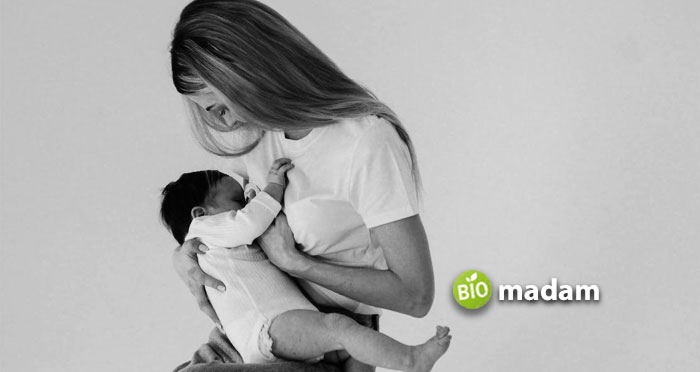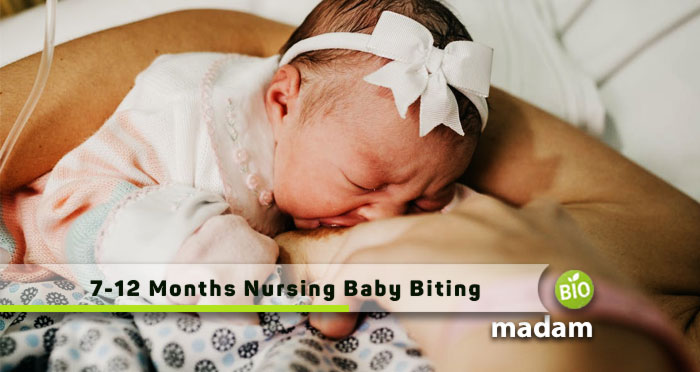Picture the tender moments of cradling your baby, their tiny hands and feet a testament to the miracle of growth. As your little one progresses from gurgles to giggles, they embark on a journey of exploration, discovering the world around them. Amidst this whirlwind of development, there’s a phase that brings its own unique challenges – the months when breastfeeding evolves into a dance of discovery, sometimes accompanied by an unexpected nibble.
In the next few paragraphs, we’ll navigate through the realm of 7 to 12-month-old babies and their newfound habit of nipple biting during breastfeeding. Let’s unravel this phenomenon and find practical ways to ensure both you and your baby continue to enjoy these cherished moments.
Understanding the Developmental Stage
As your baby progresses from 7 to 12 months, you’ll witness remarkable changes in their physical and cognitive development. By understanding these changes, you can better comprehend why nipple biting might occur. During this period, your baby’s first teeth might start emerging, and their motor skills will be improving. Additionally, their curiosity will be at an all-time high, which can lead to exploring their surroundings in unexpected ways – including biting during breastfeeding.
Signs and Triggers
Recognizing the signs that your baby is about to bite can help you take preventive measures. Watch out for signs like:
- Early Indications: Stay vigilant for signs like jaw tension, altered sucking rhythm, or playful expressions that might precede biting.
- Common Triggers: Babies can bite due to distraction – their curiosity shifts while feeding. Teething discomfort can lead to biting as gums are irritated. Changes in milk flow might also trigger biting.
- Being Proactive: Create a calm environment to minimize distractions. Offer a teething toy before feeding to soothe discomfort. Ensure a secure latch to ease frustration from fluctuating milk flow.
How to Get a 7-Month-Old Baby to Stop Biting While Breastfeeding
At 7 months, your baby is likely discovering their newfound motor skills and perhaps even showing signs of teething. To prevent biting, ensure a proper latch during feeding sessions. Maintain a watchful eye during feeding, as sometimes babies may bite out of curiosity. Offering a teething toy before nursing can help soothe their gums and redirect their need to bite.

How to Get an 8-Month-Old Baby to Stop Biting While Breastfeeding
By 8 months, your baby’s biting behavior might be more intentional. Positive reinforcement can work wonders here. If your baby refrains from biting, praise them gently. If biting occurs, express discomfort by calmly saying “no” and pausing the feeding briefly. This will help them understand the connection between biting and an interrupted feeding session.
How to Get a 9-Month-Old Baby to Stop Biting While Breastfeeding
At 9 months, your baby’s curiosity is in full swing. If biting becomes a habit, be consistent in your reaction. Gently remove your breast and end the feeding session for a short period. This teaches them that biting results in a temporary cessation of the comforting feeding experience. Maintain eye contact and explain in soothing tones that biting is not acceptable.
How to Get a 10-Month-Old Baby to Stop Biting While Breastfeeding
As your baby nears the 10-month mark, they might use communication attempts to express their needs. Use this as an opportunity to establish breastfeeding etiquette. If they bite, gently unlatch them and say something like, “Biting hurts mommy. We need to be gentle.” This will help them associate biting with negative consequences and encourage them to communicate differently.
How to Get an 11-Month-Old Baby to Stop Biting While Breastfeeding
Approaching the one-year mark, your baby is becoming more expressive. Engage them in gentle conversation about breastfeeding before each session. Use simple words and gestures to convey that biting hurts. Encourage them to communicate their hunger or comfort needs without resorting to biting.
How to Get a 12-Month-Old Baby to Stop Biting While Breastfeeding
At one year, you might be contemplating weaning. This transition period provides an opportunity to address biting. If biting persists, try offering a breastfeeding necklace or a soft toy during feedings. This gives them something to hold and explore without resorting to biting.
Practical Tips for Addressing Biting
Following are some amazing tips for moms to help with biting issues:
- Reacting with calmness can help prevent the situation from escalating.
- Minimize distractions during feeding sessions to keep your baby focused.
- Offer a teething toy or a cold washcloth before feeding to soothe their gums.
- Finding a comfortable feeding position can reduce the likelihood of biting.

Promoting Positive Feeding Experiences
Remember, breastfeeding is not just about sustenance; it’s a connection between you and your baby. Responding patiently and consistently to biting incidents will help nurture a positive breastfeeding relationship. Your baby learns from your reactions, and over time, they will understand that gentle nursing is the way to go.
Conclusion
By understanding your baby’s developmental stage and employing age-appropriate strategies, you can navigate this breastfeeding challenge with confidence. As you adapt your approach to each age, you’re fostering a positive feeding experience that benefits both you and your growing baby. And remember, seeking guidance from healthcare professionals or joining supportive communities can provide you with valuable insights and reassurance along the way.

People call me Domonique Smith in Ross! I was always fond of helping people, so opted an MBBS degree to pursue my passion as my career. My major interests fall in dealing with pregnant ladies and helping them in the best of my wills for their comfort. I am further planning to choose Gynecology as my major, so wish me luck!

